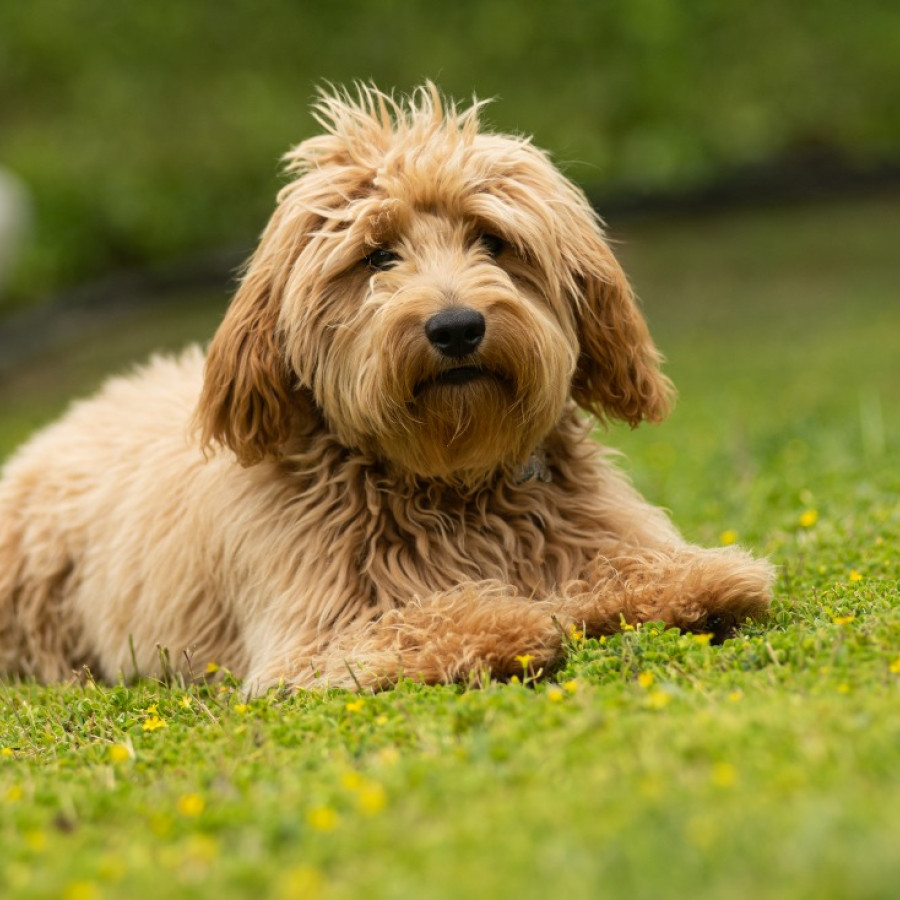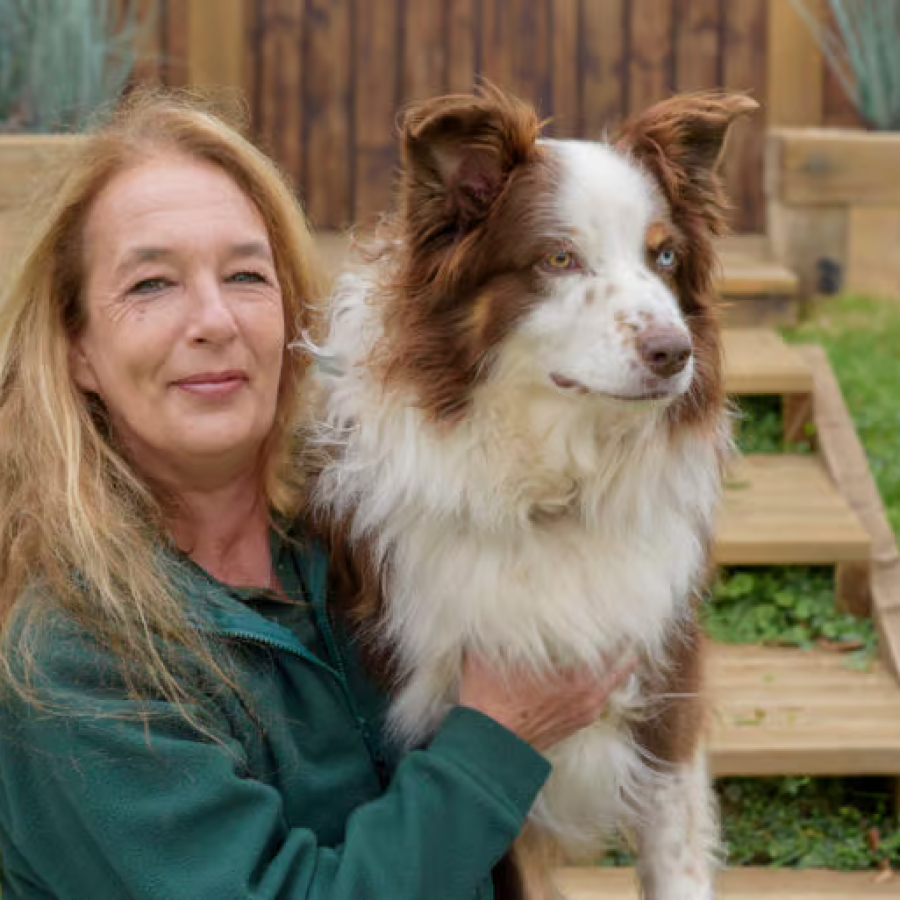
Goldendoodle (Mini) Dog Breed
The friendly Goldendoodle will bring a lot of sparkle into your life. But be prepared to put in the time they need to thrive!

The friendly Goldendoodle will bring a lot of sparkle into your life. But be prepared to put in the time they need to thrive!
This popular breed type is a cross between the Golden Retriever and a Poodle. If you buy from a breeder, it’s essential that you ask about the size of the Poodle parent – so you know what to expect! Poodles come in three sizes: toy, miniature (or medium), and standard. A Goldendoodle can be a cross between the two breeds, a combination of two Goldendoodles or a mix of Goldendoodle and one of the parent breeds. Their size and weight varies a lot, but one thing they all share in common is their adorable teddy bear looks!
The Golden Retriever is generally known to be a tolerant, easy-going breed. But the same can’t always be said for the Toy Poodle. Their petite size and fragile nature can make them vulnerable and defensive. Crossing these dogs with a well-balanced, placid breed like the Retriever can even out their personality. It’s fair to say the Miniature Poodle has more confidence than the Toy variety. So crossing this breed with a Retriever will mean a better chance of a balanced personality.
Smaller Poodle breeds are usually bred for companionship. They can be a bit needy and nervous, preferring regular short walks rather than one long one. The Goldendoodle Mini/Medium is an intelligent little dog that will enjoy a cuddle on the sofa and having lots of fun.
Disclaimer
While these breed traits give a general idea of what to expect from a specific type of dog, it's important to remember that every dog is unique. Just like people, each dog comes with their own distinct personality, quirks, and characteristics!

Yes, depending on their size! The middle-sized variety (medium) is less likely to knock small children over in play. They’re also more manageable on walks and don’t have the same level of energy or endurance as the larger type. But they’re still playful, highly entertaining, and great companions.
The smallest variety (Toy) can be more fragile and nervier, so they aren’t suited to living with young children. They tend to have a lower level of tolerance and don’t always like to share their favourite person either!
These two smaller varieties are very much companion dogs and wouldn’t suit a home where they’d be left alone for long periods.
They’re an ideal match for a retired couple/person or someone who’s able to work from home.
Yep! All sizes of Goldendoodle are affectionate and love physical attention. This means you’ll need to be prepared to share your armchair, sofa, and maybe even your bed with them (if you allow it, of course!). Don’t be surprised if they become your little shadow. The smallest variety can be affectionate to the point of being needy. This needs to be considered if you need to leave your dog home alone.
The short answer is yes! All Goldendoodles adore are known to be playful. The medium and larger type in particular love seek and find games, as well as chasing and retrieving toys.
As the Standard Poodle and the Golden Retriever have gundog (hunting) roots, they’re hardwired to using their nose and having things in their mouth. The intelligence of the Poodle means they need a high level of mental stimulation, which can be satisfied through play. So if you’re considering a Goldendoodle of any size, you’ll need enough time to devote to regular play sessions.
Whilst Retrievers aren’t the noisiest breed, the two smaller sizes of Poodle are known for liking the sound of their own voice! They’ll certainly let you know if they hear something out of the ordinary, or if they’re not getting enough attention. But this shouldn’t be a deal breaker. If these dogs’ needs are met, their barking can be managed effectively.
Goofy, active and intelligent are just a few ways to describe these dogs. They can make a lovely family pet or companion – as long as their needs are met. This includes essentials like training, exercise, and mental stimulation.
If your Goldendoodle feels bored or frustrated, they’ll let you know. This could take the shape of nuisance barking, chewing, and/or digging holes in your lawn.
They love the companionship of people or other dogs. If left for long periods of time on their own, they can become stressed and problematic.
Labradoodles are social butterflies, so they need to be socialised well. This will ensure they have good manners around people – not jumping or barking in excitement too much! Socialisation is about teaching a puppy to interact in an appropriate way with people and other dogs.
Like all dogs, Goldendoodles need time, care, and attention to help them live their best lives.
As you can imagine, the size of your Goldendoodle will determine the type of home environment they need. The smaller varieties can live in flats. But you’ll need to give them regular toilet breaks outside. Medium and standard sizes can play nicely with other dogs, as long as they’ve been socialised. The smaller sized type can struggle with the playfulness of large, bouncy dogs.
Goldendoodles need a lot of attention from their humans. So if you’re keen on this breed, stop and think before taking the plunge.
Whilst the Goldendoodle Mini/Medium doesn’t need huge amounts of exercise, they do still require between 30 and 60 minutes of free- running fun every day. They don’t have as much stamina as the larger variety, so shorter, more frequent, sessions will keep them happy.
As well as exercise, this sociable breed will enjoy visits with you to local dog-friendly cafes and garden centres.
Don’t forget, the Poodle is one of the most intelligent breeds. So it’s essential their brains are exercised as well as their bodies!
Yes! Both the Poodle and the Labrador Retriever are very smart.
The Goldendoodle Mini/Medium usually has more Poodle in them, so they’re super smart.
This breed is motivated by food and toys, and loves to learn new things. Socialisation and habituation training are essential for all puppies, and Goldendoodles are no different. They need to learn how to come when called so they can enjoy off-lead exercise. Staying on all four paws is also something worth teaching them early on. These dogs love people, and no one wants muddy footprints on them!
Like with most dogs, adolescence can be challenging. But hang in there, and it will be worth the effort once they hit maturity! Goldendoodles don’t like spending time alone, so take home alone training slow and steady. The key to success is to starting with short periods on their own.
So, how do you keep your Goldendoodle’s coat looking fabulous? All types of this crossbreed will need a lot of pampering. Their coats can be curly, wavy, fleecy, or straight. The Goldendoodle tends to have more Poodle in them than Retriever, so their coats lean more towards curly. Unfortunately, this can mat and knot quickly, which can pull on the skin and be painful. So daily grooming sessions of 15 minutes are essential.
We also recommended having your Goldendoodle professionally groomed every six weeks. This means they’ll be bathed, groomed, and clipped/trimmed, along with having their ears cleaned and nails clipped. Keeping your dog’s coat immaculate is an ongoing cost you need to consider.
Both the Poodle and the Labrador Retriever are affected by a number of genetic health issues, which a trusted breeder should test for before selling them. These include:
Hip dysplasia and elbow dysplaysia: a genetic condition affecting the joints, leading to pain and mobility issues.
Eye cataracts
Heart problems
Thyroid issues
Von Willebrand disease (where the blood doesn’t clot properly)
Cancer
You can help keep your dog in tip-top shape with regular health checks, a good diet and exercise.
I’m full of life, and lots of fun! I need two walks of around 30 minutes every day. Plenty of playtime and snuggles on the sofa are key to keeping me happy!
I’m incredibly bright and love to learn new things. Activity toys and puzzle feeders are a great way to keep me entertained when you’re busy doing other stuff.
I can turn my paws to lots of different things. Tricks and agility are my favourites. Please teach me how to come when called so I can enjoy off-lead exercise.
The purchase price of a Goldendoodle puppy can range from £800 to £3,000 depending on the quality of the breeding.
It can cost several hundred pounds in set-up costs for any puppy. This includes food, bed, bowls, toys, stairgates, a puppy pen, harness, collar, lead etc.
The ongoing costs include insurance premiums, food, grooming fees, parasite control and training classes.
Take our quiz to discover which breed is right for you
Take our quizPlease call our pet support line on 0300 303 9333 (7 days a week – 8.30am - 4pm)